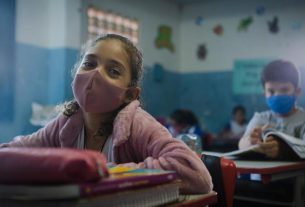Everyone, it seems, is more than ready to move on from Covid-19, but virus experts say it’s still too early for us to lower our guard.
That’s because the pandemic, they insist, is far from over. Indeed, in a typical week, 180 000 new cases are still being reported across Europe. So, while regular life has resumed for most of us – and the World Health Organization has dropped the status of Covid-19 as a ‘global emergency’ (the highest level of alert) – scientists remain vigilant.
‘We might have good control over the pandemic – and the vaccine has played a major role in achieving this – but the virus continues to persist, and the situation is still very dynamic,’ said Professor Giuseppe Pantaleo, head of Immunology and Allergy at the Swiss Vaccine Research Institute.
The virus causing Covid-19 is an artful opportunist, endlessly evolving to evade our defences – and with each significant mutation comes the threat of a new wave of infection. According to Pantaleo, a time is likely to come when our current defences – whether built up through infection or acquired by vaccination – will no longer effectively counter the virus. Complacency could be a costly mistake.
‘It’s critical for us to keep monitoring populations for new variants,’ said Pantaleo. ‘We need to know the impact each mutation has on the effectiveness of vaccines and treatments so we can be prepared for what is coming next and put in place new measures to control the spread.’
Active surveillance
Pantaleo coordinates CoVICIS, a three-year Covid-19 surveillance programme due to end next year and funded by the EU to the tune of €10 million.
“
It’s critical for us to keep monitoring populations for new variants.
CoVICIS involves researchers in Switzerland, Italy, France, Germany, South Africa and Ethiopia. African involvement is essential for the project to fulfil its ambition of evolving into a surveillance platform with a global reach.
Most countries on the African continent lack the infrastructure to monitor infections within their borders. Moreover, much of Africa’s population remains unvaccinated, said Pantaleo, meaning the virus has more opportunity to spread and mutate (a fact that probably explains why several variants, including Omicron, first emerged in Africa).
For good reason then, monitoring the evolution of Covid-19 in Africa is a pressing concern. However, Pantaleo hopes the programme will set the stage for collaborations with an even wider reach.
‘This pandemic has taught us that when it comes to dangerous pathogens we are all connected. We need to establish a new type of research infrastructure so, when it’s time to deal with a new virus, we can quickly mobilise the world’s scientific community and work as one,’ he said.
Identifying risk
Since the earliest days of the pandemic, scientists have been looking for new means to predict how any given person is likely to respond to a Covid-19 infection. The way some experience the virus as a mild cold while others die can seem almost random. Though there’s no doubt that having a comorbidity or an underlying non-diagnosed condition puts a person at higher risk, little is known about why some healthy individuals develop severe Covid-19.
There are two types of at-risk patients the researchers hope to identify: those who are hit hard during the acute phase of illness and those who are saddled with the debilitating symptoms of long-Covid.
“
For a substantial number of people, an infection leads to problems that affect the entire body and persist long-term.
‘What we must remember is that for many people, the virus causing Covid does not simply infect the lung cells, cause a few pulmonary problems and then go away,’ said Dr Yvan Devaux, leader of the Cardiovascular Research Unit at the Luxembourg Institute of Health. ‘For a substantial number of people, an infection leads to problems that affect the entire body and persist long-term.’
What has become clear from the work by Devaux and others is that Covid-19 can be bad for your heart.
One study of 160 000 unvaccinated people found that infected patients in the acute phase of their illness are four times more likely than uninfected individuals to develop a major cardiovascular disease – and 40% more likely in the 18 months that follow.
Taken to heart
This is true regardless of age, sex, race or pre-Covid-19 health status and whether an infection is mild or severe. However, the worst cardiovascular outcomes are experienced by Covid-19 patients who end up in intensive care and people with pre-existing cardiovascular conditions.
In other words, serious infections increase the likelihood of developing heart conditions and pre-existing heart conditions increase the likelihood of dying from Covid-19.
The problem is, cardiovascular disorders have an uncanny ability to remain hidden: a heart attack is often the first sign of an underlying problem. For this reason, finding reliable ways to expose cardiac problems before they become critical has long been a research priority within the EU.
Devaux and his collaborators have been trying to find new tests to diagnose cardiovascular conditions for many years. The pandemic simply spurred them on.
New tests to pre-empt complications
In March 2020 – the same month the World Health Organization declared Covid-19 a pandemic – the team decided to find a way to identify Covid-19 patients who were most likely to develop heart complications after an initial infection.
‘We had good reason to believe there would be a strong link between Covid infection and coronary heart conditions,’ said Devaux, ‘and we wanted to be part of the international effort to save lives.’
The EU-funded COVIRNA project is devising a test to predict who is most likely to develop cardiovascular complications.
The hope is that an affordable blood test will soon be ready to roll out to hospitalised Covid-19 patients. It will measure a specific type of free-floating RNA molecule that has been linked to cardiovascular disease.
The researchers have collated RNA data from 2 000 study participants and are currently using artificial intelligence to analyse this information and create a reliable tool to predict an individual’s risk.
High-risk patients will then receive personalised care to monitor their health and, if necessary, receive treatment to degrade the troublesome RNA molecules.
‘Patients would get the test a few days into the disease and doctors would then be able to tailor their care – for instance, by sending them for a heart MRI scan when they otherwise wouldn’t have one or by redirecting them to a cardiologist to be watched closely,’ said Devaux.
‘We might not be able to close the last page on Covid quite yet, but this test could be considered a good output of the pandemic.’
Research in this article was funded by the EU. If you liked this article, please consider sharing it on social media.


